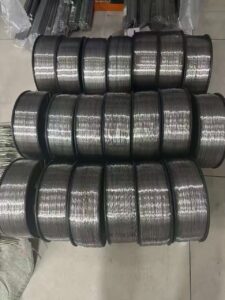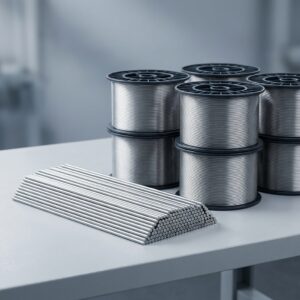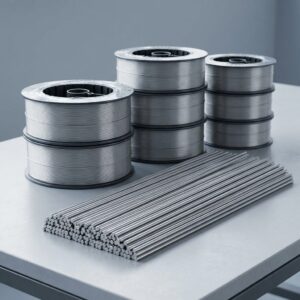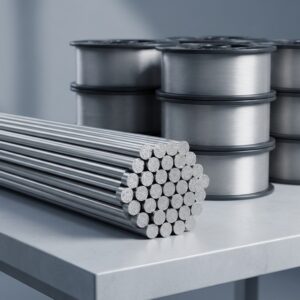Overview
In the realm of high-performance industrial materials, titanium wire TC4 stands tall as a true powerhouse. This exceptional titanium alloy combines unparalleled strength, corrosion resistance, and temperature tolerance, making it an indispensable choice for a wide range of demanding applications. From aerospace and automotive to chemical processing and energy exploration, titanium wire TC4 has become a go-to solution for engineers and manufacturers seeking a material that can withstand the toughest challenges. In this comprehensive guide, we’ll dive deep into the intricacies of this remarkable alloy, exploring its unique properties, diverse applications, and the cutting-edge innovations that continue to push the boundaries of what’s possible.
Composition and Remarkable Properties
At the core of titanium wire TC4’s extraordinary capabilities lies its meticulously engineered composition. This alpha-beta titanium alloy is a masterful blend of titanium, aluminum, and vanadium, carefully balanced to achieve a superior combination of properties. Let’s take a closer look at the key characteristics that set titanium wire TC4 apart:
- Unrivaled Strength: Titanium wire TC4 boasts an impressive strength-to-weight ratio, far exceeding that of many conventional materials. This remarkable strength is derived from the strategic addition of aluminum and vanadium, which reinforce the titanium matrix and enable the wire to withstand immense loads and stresses without compromising its lightweight nature.
- Corrosion Resistance Extraordinaire: Corrosion is no match for titanium wire TC4. This alloy forms a tenacious, self-healing oxide layer on its surface, acting as an impenetrable barrier against various corrosive environments, including harsh chemicals, saltwater, and atmospheric conditions. This exceptional corrosion resistance ensures long-lasting performance and reduced maintenance costs.
- Thermal Stability Unleashed: Whether subjected to scorching temperatures or extreme cold, titanium wire TC4 maintains its structural integrity and performance. This thermal stability makes it an ideal choice for applications involving high-temperature processes, jet engines, or cryogenic environments, where other materials might falter.
- Biocompatibility Redefined: Titanium wire TC4 is highly biocompatible, minimizing the risk of adverse reactions or tissue rejection. This property has propelled its widespread adoption in the medical field, enabling the development of advanced implants, surgical instruments, and prosthetic devices that prioritize patient safety and comfort.
Diverse Applications
The remarkable properties of titanium wire TC4 have unlocked a world of possibilities across a multitude of industries. From cutting-edge aerospace components to life-saving medical devices, this versatile material is reshaping the boundaries of what’s achievable. Let’s explore some of its most prominent applications:
- Aerospace Ingenuity: In the aerospace industry, where weight savings and high-temperature performance are paramount, titanium wire TC4 has become an essential component. It is used in the construction of aircraft engines, airframes, and critical structural components, contributing to improved fuel efficiency, reduced emissions, and enhanced safety.
- Automotive Excellence: The automotive industry is constantly seeking lightweight and high-strength materials to improve vehicle performance and efficiency. Titanium wire TC4 has found its way into various automotive applications, such as suspension components, exhaust systems, and high-performance engine parts, delivering uncompromising performance and durability.
- Medical Marvels: The biocompatibility and corrosion resistance of titanium wire TC4 have revolutionized the medical field. It is widely used in surgical instruments, implants, orthodontic wires, and prosthetic devices, ensuring safe and effective treatments while promoting faster healing and recovery.
- Chemical Processing Prowess: In the chemical processing industry, where harsh environments and corrosive substances are the norm, titanium wire TC4 has proven to be an invaluable asset. It is utilized in the construction of piping systems, heat exchangers, and reaction vessels, enabling safe and efficient handling of aggressive chemicals.
- Energy Exploration Resilience: The energy sector, particularly in offshore oil and gas exploration, demands materials that can withstand the harsh marine environment. Titanium wire TC4’s exceptional corrosion resistance and strength make it an ideal choice for offshore platforms, subsea equipment, and piping systems.
- Sporting Goods Innovation: In the world of sports and recreation, where performance and durability are paramount, titanium wire TC4 has found its way into high-end equipment. From lightweight and ultra-strong bicycle frames to premium golf clubs and tennis rackets, this alloy is revolutionizing the way athletes push their limits.
Manufacturing Processes and Quality Control
Producing titanium wire TC4 requires advanced manufacturing techniques and stringent quality control measures to ensure consistent performance and reliability. Here’s a glimpse into the processes involved:
- Vacuum Arc Remelting (VAR): This specialized melting process is used to produce high-purity titanium ingots by melting and solidifying the alloy in a vacuum environment, minimizing impurities and ensuring consistent chemical composition.
- Hot Extrusion and Cold Drawing: Heated titanium billets are extruded through dies to form wire rods, which are then subjected to a series of cold drawing steps to reduce the diameter and enhance the wire’s strength and uniformity.
- Surface Treatments: Titanium wire TC4 can undergo various surface treatments, such as anodizing, nitriding, or coating, to enhance specific properties like wear resistance, lubricity, or electrical conductivity, tailoring it for specialized applications.
- Rigorous Testing and Inspection: Throughout the manufacturing process, titanium wire TC4 undergoes a comprehensive range of tests and inspections to ensure compliance with stringent quality standards. These include mechanical testing, metallographic analysis, chemical composition verification, and non-destructive testing techniques like ultrasonic inspection and eddy current testing.
Environmental Impact and Sustainability
In an era where environmental consciousness is of paramount importance, titanium wire TC4 stands out as an eco-friendly choice. Titanium is a highly recyclable material, and the manufacturing processes involved in producing titanium wire TC4 have a relatively low environmental impact compared to other metals. Additionally, the exceptional corrosion resistance and long service life of this alloy contribute to reduced waste and energy consumption, aligning with sustainable practices and promoting a greener future.
Cutting-Edge Innovations and Future Developments
The realm of titanium wire TC4 is constantly evolving, driven by the relentless pursuit of innovation and technological advancements. Material scientists and researchers are continuously exploring new frontiers, pushing the boundaries of what’s possible with this remarkable alloy. Some of the exciting areas of focus include:
- Improved Strength and Ductility: Ongoing research aims to develop titanium alloys with even higher strength and ductility, enabling the production of wires that can withstand greater loads and deformations without compromising their structural integrity.
- Enhanced Corrosion Resistance: Efforts are underway to develop titanium alloys with superior corrosion resistance, expanding their applications in highly corrosive environments, such as offshore oil and gas operations or chemical processing.
- Additive Manufacturing Integration: The integration of additive manufacturing techniques, such as wire-based 3D printing, could revolutionize the production of complex titanium wire components, opening up new possibilities in various industries.
- Surface Engineering Advancements: Advancements in surface engineering techniques, such as plasma nitriding or ceramic coatings, could further improve the wear resistance, lubricity, and functional properties of titanium wire TC4, tailoring it for specialized applications.
- Alloy Optimization: Ongoing research into alloy compositions and heat treatments aims to further optimize the properties of titanium wire TC4, potentially unlocking new applications and pushing the boundaries of performance.
Frequently Asked Questions (FAQs)
- What sets titanium wire TC4 apart from other titanium alloys? Titanium wire TC4 stands out due to its unique combination of exceptional strength, corrosion resistance, and temperature tolerance. This well-balanced set of properties makes it suitable for a wide range of demanding applications where other alloys may fall short.
- Is titanium wire TC4 more expensive than conventional materials? While titanium wire TC4 is relatively more expensive than some conventional materials, its exceptional performance and longevity often justify the initial investment, making it a cost-effective solution in the long run, especially for critical applications.
- Can titanium wire TC4 be welded or joined? Yes, titanium wire TC4 can be welded or joined using various techniques, such as gas tungsten arc welding (GTAW), laser beam welding, or friction stir welding. However, specific procedures and precautions must be followed to ensure proper joining and prevent contamination or degradation of the material’s properties.





